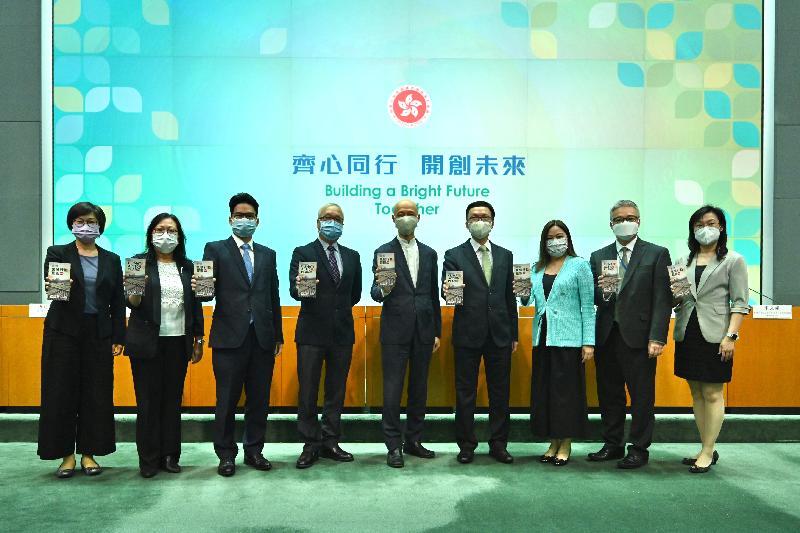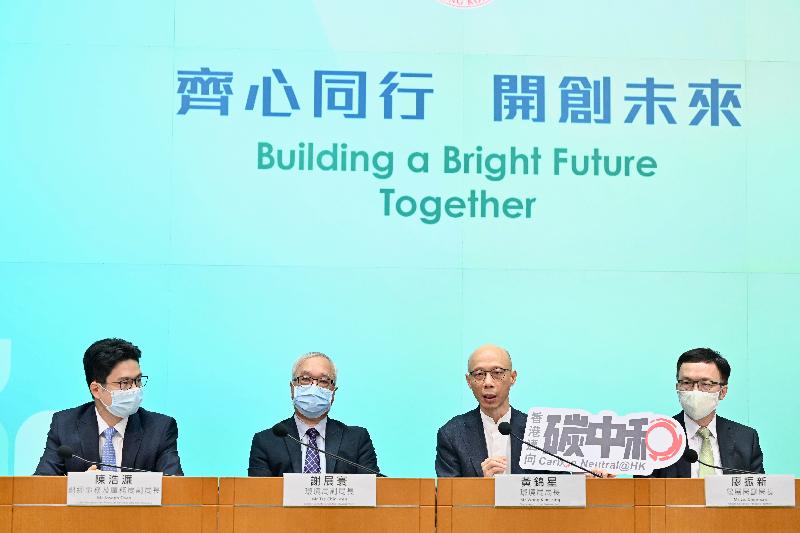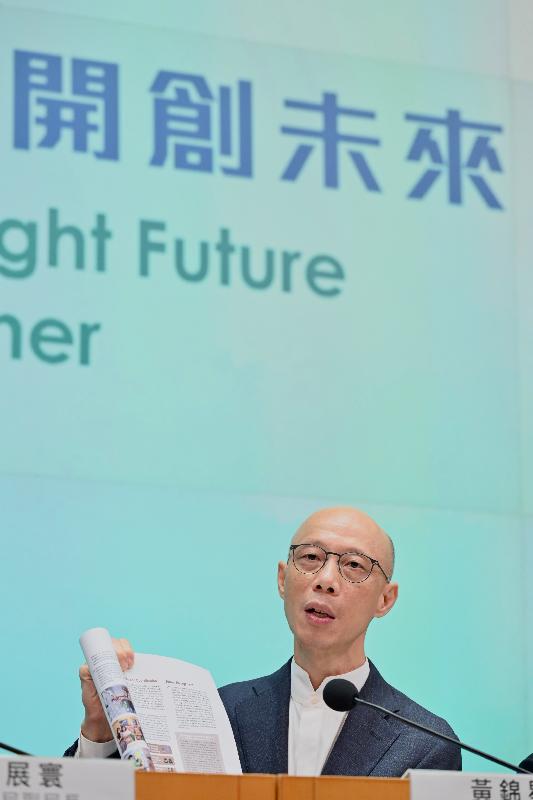Government announces Hong Kong's Climate Action Plan 2050 (with photos)
***********************************************************************
In response to the Paris Agreement, the Government announced Hong Kong's Climate Action Plan 2030+ in 2017, setting out the decarbonisation target of reducing Hong Kong's carbon intensity by 65 per cent to 70 per cent by 2030 using 2005 as the base, which is equivalent to a reduction in the total carbon emissions by 26 per cent to 36 per cent. With the implementation of various mitigation measures, Hong Kong is moving steadily towards the 2030 decarbonisation target. The carbon intensity in 2019 was about 35 per cent lower than that in 2005. Preliminary estimation shows that the per capita carbon emissions would be reduced from the peak level of 6.2 tonnes in 2014 to about 4.5 tonnes in 2020.
The Chief Executive announced in the Policy Address last year that the Hong Kong Special Administrative Region would strive to achieve carbon neutrality before 2050. She also chairs a new Steering Committee on Climate Change and Carbon Neutrality to formulate the overall strategy. To achieve the carbon neutrality target, the Chief Executive announced in the Policy Address this year that Hong Kong's Climate Action Plan 2050 would set out more proactive strategies and measures on reducing carbon emissions, and would pursue more vigorous interim decarbonisation targets to reduce Hong Kong's carbon emissions by 50 per cent before 2035 as compared to the 2005 level.
Announcing the updated Climate Action Plan today, the Secretary for the Environment, Mr Wong Kam-sing, said, "In 2019, electricity generation was Hong Kong's largest source of carbon emissions (66 per cent), followed by transport (18 per cent) and waste (7 per cent). Therefore, our decarbonisation work should focus on these three key areas. Leading Hong Kong towards the goal of carbon neutrality, the new plan outlines the four major decarbonisation strategies and measures, namely net-zero electricity generation, energy saving and green buildings, green transport and waste reduction."
The four major decarbonisation strategies in Hong Kong's Climate Action Plan 2050 cover the following targets and measures:
- Net-zero electricity generation: Cease using coal for daily electricity generation; increase the share of renewable energy in the fuel mix for electricity generation to 7.5 per cent to 10 per cent by 2035, and to 15 per cent subsequently; and try out the use of new energy and strengthen co-operation with neighbouring regions to achieve the long-term target of net-zero electricity generation before 2050.
- Energy saving and green buildings: Reduce the overall electricity consumption of buildings through promoting green buildings, improving buildings' energy efficiency and promoting a low-carbon lifestyle. The goal is to reduce the electricity consumption of commercial buildings by 30 per cent to 40 per cent and that of residential buildings by 20 per cent to 30 per cent from the 2015 level by 2050, and to achieve half of the above targets by 2035.
- Green transport: Achieve the long-term target of attaining zero vehicular emissions and zero carbon emissions in the transport sector before 2050, through the electrification of vehicles and ferries, development of new-energy transport and measures to improve traffic management. The Government will cease the new registration of fuel-propelled and hybrid private cars in 2035 or earlier. Apart from promoting electric buses and commercial vehicles, the Government also plans to collaborate with the franchised bus companies and other stakeholders in the next three years to test out hydrogen fuel cell electric buses and heavy vehicles.
- Waste reduction: To achieve the long-term target of carbon neutrality in waste management before 2050, the Government will strive to develop adequate waste-to-energy facilities by 2035, so as to move away from reliance on landfills for municipal waste disposal. The Government will also further promote waste reduction and recycling, and expects to implement waste charging in 2023 and regulate disposable plastic tableware in phases from 2025 onwards.
In the next 15 to 20 years, the Government will devote about $240 billion to take forward various measures on climate change mitigation and adaptation. The Environment Bureau will also set up a new Office of Climate Change and Carbon Neutrality to strengthen co-ordination and promote deep decarbonisation. Also, a dedicated advisory committee on combating climate change will be formed to encourage different sectors in the community, including young people, to participate actively in climate actions.
"Achieving carbon neutrality before 2050 is extremely challenging and requires the participation of the whole community. The public can contribute by practising a low-carbon lifestyle through energy saving and waste reduction and recycling, etc, in their daily lives. I hope that various sectors of the community will join hands with the Government to build a bright future together in a bid to strive towards the goal of carbon neutrality, with a view to achieving the vision of 'Zero-carbon Emissions‧Liveable City‧Sustainable Development'," Mr Wong added.
The Council for Sustainable Development, upon the invitation of the Government, conducted a public engagement exercise on Hong Kong's long-term decarbonisation strategy, and submitted a report to the Government in November 2020. Mr Wong expressed his heartfelt gratitude to the Council and different stakeholders for offering their views in the past two years, and to various bureaux and departments for their support and contributions during the preparation of Hong Kong's Climate Action Plan 2050.
"Combating climate change is a long-term task that requires unwavering efforts. We will, in line with the spirit of the Paris Agreement, conduct a review about every five years to keep up with the times," Mr Wong added.
Hong Kong's Climate Action Plan 2050 and its leaflet are available at the Climate Ready website (www.climateready.gov.hk).
Ends/Friday, October 8, 2021
Issued at HKT 16:30
Issued at HKT 16:30
NNNN







